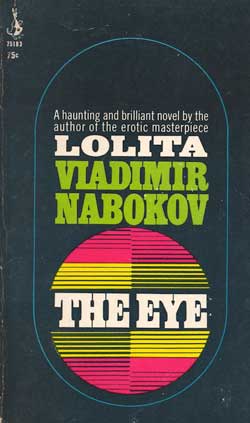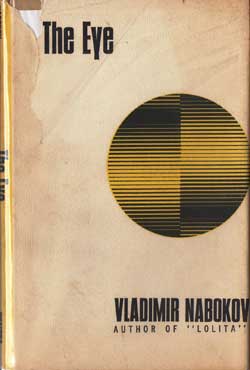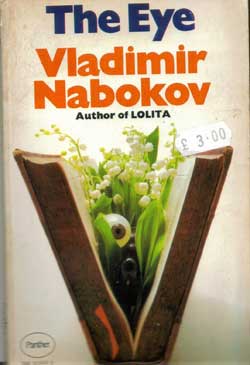 “The theme of The Eye is the pursuit of an investigation which leads the protagonist through a hell of mirrors and ends in the merging of twin images.” That plot description is from Vladimir Nabokov’s own foreword to the 1965 English publication of The Eye. The protagonist Mr. Nabokov spoke of is a Russian émigré (a common theme in his body of work) living in Berlin and working as a tutor for two young boys in whose home he lodges. An attractive friend of the family, Matilda, visits, and he starts an illicit affair with the married woman. Her husband finds out and beats the tutor in front of the young pupils. Agonized from shame, the tutor packs his bags and leaves. He finds another room, then shoots himself in the heart with a revolver.
“The theme of The Eye is the pursuit of an investigation which leads the protagonist through a hell of mirrors and ends in the merging of twin images.” That plot description is from Vladimir Nabokov’s own foreword to the 1965 English publication of The Eye. The protagonist Mr. Nabokov spoke of is a Russian émigré (a common theme in his body of work) living in Berlin and working as a tutor for two young boys in whose home he lodges. An attractive friend of the family, Matilda, visits, and he starts an illicit affair with the married woman. Her husband finds out and beats the tutor in front of the young pupils. Agonized from shame, the tutor packs his bags and leaves. He finds another room, then shoots himself in the heart with a revolver.
After death, he learns his problems are only just beginning, because his mind cannot find peace until it “manages to unravel the complex consequences of his reckless terrestrial actions.” In this prolongation of life on Earth, “Human thought, liberated from the body, keeps on moving in a sphere where everything is interconnected as before.”
Fortunately for us mortals, he is still able to narrate the journey from beyond the grave, along the lines of another farcical mystery, Sunset Boulevard. However, in that Billy Wilder film classic, Joe Gillis (William Holden), our deceased voice-over, is only interested in telling his side of the Norma Desmond tale. Our chronicler in The Eye is maneuvering through a new realm of consciousness: unraveling the mystery of Shakespeare’s undiscovered country and finding many similarities with droll pursuits on Earth like securing a job and accommodations. He soon becomes intrigued by a family residing upstairs from him, in particular, an attractive young woman named Varvara, nicknamed Vanya. (Sidebar: In these colorful passages, Nabokov’s stylish prose is on full display: “She had a married sister, Evgenia, a young woman with a nice squarish face that made you think of an amiable and quite handsome bulldog.” Raymond Chandler, eat your heart out!) His quizzical nature soon turns toward a blundering enigma called Smurov who is courting Vanya. Our narrator has a hard time believing she would be interested in this dolt, who tells elaborate lies of escaping the Russian Revolution and is quickly, and embarrassingly, exposed as a fraud.
A spoiler alert should be announced…
 …though on the back cover of the latest edition I purchased, it gave away this reveal, for which, in hindsight, there were plenty of clue. Still with me? Okay, Smurov is the tutor who killed himself and he’s watching his own interaction in this new world. Also, each person in Smurov’s life views him in a Rashomon-style prism, based upon their own life experiences. A continuing theme running through The Eye is the juxtaposition of subjectivity and objectivity. How people judge each other and how that shapes other characters. Smurov deduces about himself, “I could already count three versions of Smurov, while the original remained unknown.”
…though on the back cover of the latest edition I purchased, it gave away this reveal, for which, in hindsight, there were plenty of clue. Still with me? Okay, Smurov is the tutor who killed himself and he’s watching his own interaction in this new world. Also, each person in Smurov’s life views him in a Rashomon-style prism, based upon their own life experiences. A continuing theme running through The Eye is the juxtaposition of subjectivity and objectivity. How people judge each other and how that shapes other characters. Smurov deduces about himself, “I could already count three versions of Smurov, while the original remained unknown.”
An anxiety wending throughout the plot is that there are Russian agents in the afterlife-Berlin conducting clandestine missions. A Mr. Weinstock, Smurov’s landlord and employer, has been consulting with a medium (hilarious touch that, even in death, we still wish to speak with the dead), and the otherworldly spirit fingers Smurov as a spy. “He spies, lures, betrays. Be on your guard. Watch out for a small man in black. Do not be deceived by his modest appearance.” Then, six letters are spelled out on the crude Ouija style board, but Mr. Weinstock can’t for an instant believe that Smurov, who fibs about his exploits, a weak man who killed himself because of an infidelity, is a notorious spy. Weinstock shrugs off the spirit. “It happens quite often at séances that spirits spout nonsense.”
 Nabokov jumps between first and third person narration, and, like many of his novels, it’s up to the reader to hug the trail close, to keep an open and alert mind. Is Smurov dead? Or, is he in a new hereafter version of reality, where what we did in our first life lingers like a hall of mirror’s twisted refraction? Is there more than one Smurov? Biographer Brian Boyd notes in his splendid Vladimir Nabokov: The Russian Years, “Are narrator and Smurov really one, and if so, is ‘each’ conscious of the ‘other’?” Good question. It may seem that Nabokov proposes more riddles than he answers, but toward the end, a summation comes when Smurov says, “I have realized the only happiness in this world is to observe, to spy, to watch, to scrutinize oneself and others, to be nothing but a big, slightly vitreous, somewhat bloodshot, unblinking eye.” The struggle itself in both realms, Nabokov seems to be suggesting, makes life worth the living.
Nabokov jumps between first and third person narration, and, like many of his novels, it’s up to the reader to hug the trail close, to keep an open and alert mind. Is Smurov dead? Or, is he in a new hereafter version of reality, where what we did in our first life lingers like a hall of mirror’s twisted refraction? Is there more than one Smurov? Biographer Brian Boyd notes in his splendid Vladimir Nabokov: The Russian Years, “Are narrator and Smurov really one, and if so, is ‘each’ conscious of the ‘other’?” Good question. It may seem that Nabokov proposes more riddles than he answers, but toward the end, a summation comes when Smurov says, “I have realized the only happiness in this world is to observe, to spy, to watch, to scrutinize oneself and others, to be nothing but a big, slightly vitreous, somewhat bloodshot, unblinking eye.” The struggle itself in both realms, Nabokov seems to be suggesting, makes life worth the living.
The Eye was originally published in Russia in 1930 and then translated and updated thirty-five years later by the author’s son, Dimitri. It was Nabokov’s fourth novel and his shortest at just over 100 pages, encompassing interwoven ideas of one’s self worth, social construction, and how human animals relate to one another. This unique, literary tale with mysterious undertones is not to be missed.
Under the pen name of Edward A. Grainger, David Cranmer writes the continuing adventures of Cash Laramie and Gideon Miles. He is also the editor/publisher of the BEAT to a PULP webzine and books.

this intrigues me. The afterlife, if it exists, is such a curious mystery to us.
And it seems, Mates, that according to Nabokov not a lot changes. The dead teacher is almost ignored for the most part and faces ordinary life obstacles.
Great writeup on this, David. I don’t know this novel and after reading your take on it I want to dive into it right now.
More great stuff on Nabokov, David. Really enjoyed that. THE EYE is one of his books I have not read, and now I can’t wait to get to it.
Brian & Scott, Hope you both don’t mind me adding to your TBR stacks but I’m positive you will enjoy The Eye. Let me know.
David, I absolutely enjoyed reading your review but I’m not quite sure I’ll understand Nabokov’s take on human existence and the afterlife which, I think, is based on his philosophical view of life. Still, I don’t mind reading the book with an open mind.
Prashant, You may come away with a different take and I would be interested in your thoughts. You reminded me of a later quote from an older Nabokov who famously said: “The cradle rocks above an abyss, and common sense tells us that our existence is but a brief crack of light between two eternities of darkness.” So, perhaps, not so much stock should be put into any greater meaning behing The Eye except an entertaining mystery.
Sounds like Nabokov is having a lot of fun in this one.
He sure was, Ron. Life after death was a particular favorite subject of his in a number of novels.